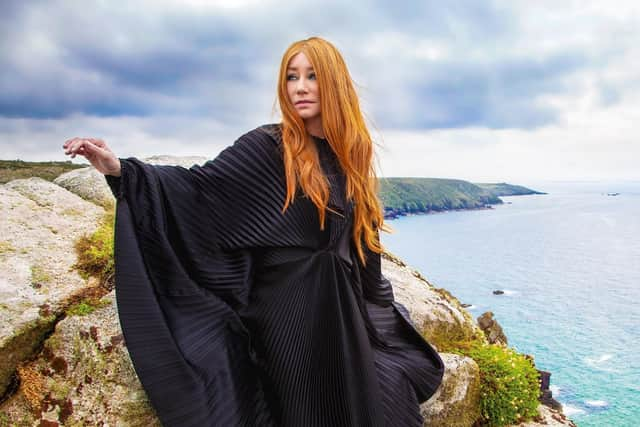Tori Amos: ‘After the Capitol insurrection I hit the wall’


The drastic act of creative cleansing was, she says today, a response to the change of circumstances in which we all found ourselves after months of lockdown as well as the downfall of US President Donald Trump that would lead, a few weeks later, to rioters storming Capitol Hill.
“I could feel that people were overwhelmed, people were exhausted by this divisive energy, particularly what was going on in the States after the election,” the 58-year-old singer-songwriter says over Zoom, telling how she’d seen friends and family in her homeland “falling out with each other” over the result.
Advertisement
Hide AdAdvertisement
Hide Ad“That’s a severing,” she says, “that’s the old application of that we’ve heard for thousands of years: divide and conquer.
“Whether we see whose finger print’s on it, whether we see it’s not just an individual, but we’re seeing the effects of it and I started to see the effects of it on me, and it was like, I have to get out of this energy field because nothing constructive is coming out of this, it’s just becoming destructive. Then after the Capitol insurrection I hit the wall and there was a sadness that overcame me and I couldn’t shake it.”
Writing new songs for Ocean To Ocean became a way of “figuring out” how to escape her low mood. She says: “The advice I was given by the muses was ‘write from this space, then you’ll find the trapdoors, you’ll find the secret library, how to get behind the cupboard, but only by admitting where you are, and then you’ll find the way out’.”
She also found it a way of “reflecting what I was hearing people were going through” during the pandemic, “but then realising that we have to get ourselves out of this, we have to find a frequency so that we can make it to the other side”.
Advertisement
Hide AdAdvertisement
Hide Ad“The problem with house arrest,” she says, “is that the way you learn to cope with uncomfortable things, most of those coping mechanisms were not available, unless lockdown is your way of processing. Being an introvert, being alone and locking yourself in your house. I think those people were jumping up and down, the wallflowers were dancing off the wallpaper, but not all of us are those severe introverts whereby that is like all of their Christmases come at once type of thing.”


For someone used to a lot of travelling work as well dividing her time between homes in Cornwall and Florida, the sudden sense of stasis was unnerving. “Even though I was in one of the most beautiful parts of the country, (travelling) not being an option was something I had to work through,” Amos says.
“I have a pretty good marriage (to English sound engineer Mark Hawley), but part of the reason I think is because I find ways to make him miss me, so I go away and then he really misses me and it’s all good because he’s one of these people who could have done lockdown on his own. He’s an only child, I call him Greta Garbo, he’s very good at being alone, but he was surrounded by me, Tasha (their 21-year-old daughter) and Tash’s boyfriend for five months on the first lockdown.”
Amos drew inspiration from the rugged coastline near her home in the Cornish town of Bude. “The coast doesn’t hide that there’s a ferocity there, you can trip and fall to your death if you’re not paying attention,” she points out. “I think you have to approach it with respect, and in so doing there’s a kind of sacred pilgrimage in that alone, by humbling yourself before the crags and the cliffs and those rocks and the gales and just saying ‘wow, this is formidable’.
Advertisement
Hide AdAdvertisement
Hide Ad“I found great comfort in that. Once (the song) Metal, Water, Wood came and I was drawn outside even in the late winter into the outdoors, I was able to feel part of the land of the living again.”
Fanmail also spurred her on. She believes her 30-year-long conversation with her audience is her “secret weapon”.
“Imagine how I drive the crew crazy (on tour),” she says. “I take up a whole bunk with letters sometimes because it takes weeks to go through them. They’re like, ‘Come on, let me take this to the incinerator’, I’m like, ‘Get away, Dalek!’ Most of my crew is British, we have a few Americans of course, it’s a mix, but the Brits are always taking the mick, saying ‘Why do you need these?’ I say ‘Because there’s an understanding that I get once I know what people have experienced and what they’re thinking and their relationship with the songs. How can you know that unless somebody confides in you? It’s a gift.’”
The songs Speaking With Trees and Flowers Burn to Gold address Amos’s late mother, Mary Ellen, who died in 2019. The singer tells of how she and her niece Kelsey Dobyns, “who also figures on the record, her presence is very much felt in the first and the last track”, were grieving at same time. “Kelsey was in New York City, I was here, and we couldn’t call Mary,” she says. “I had been hearing that some people were feeling like they were getting a visit from Mary, but I wasn’t getting that. I had one or two experiences within a year and a half, but not like some other people were telling me.
Advertisement
Hide AdAdvertisement
Hide Ad“Once I got out into nature and started opening up to Earth Mother and that energy, and realising that she wasn’t in lockdown and she was regenerating, rebirthing herself, I kind of needed to let Mary go. Maybe I was being selfish, trying to hold onto her, trying to keep her here, because I missed her so much. So there was a whole surrendering, I guess, to Earth Mother and a comforting and spending time with the trees, listening to their communication, reading about how they communicate with the network underneath by specialists who have been studying them for 30 years. During that whole process I think that I was able to really see that I needed to let Mary fly.”
It’s 30 years in January since the release of Amos’s first solo album, Little Earthquakes, a record that would influence a generation of singer-songwriters for its honesty and frankness. Looking back to the early 1990s, she says: “I had made a commitment to trying to write boldly, even if it hurt, even if it was embarrassing or felt exposed. I felt that was my calling after the disaster of (her band) Y Kant Tory Read in ’88, I was just staying true to the commitment I made to the music after that crash of an experience.
“I was just about ready to tour when it was coming out and that was my focus: to make sure that those live shows were strong and that I would be able to convey the record, to give it a strong live performance.”
In her memoir Resistance, which came out last year, she recounted some of her experiences of dealing with a very male-dominated industry. From her point of view, she says the best change she has noticed is that musicians can now go “direct to your audience, and talk to your audience in a vast way, not just letters at the stage door and going town to town like we would do in the old days”.
Advertisement
Hide AdAdvertisement
Hide Ad“That has a certain leverage that the record company doesn’t have control over,” she says. “That is different.”
She thinks she has been “very fortunate” that her audience has followed her through numerous changes of artistic direction over the years, including a chart-topping dance remix of her song Cornflake Girl, a musical, The Light Princess, and a classical crossover album that saluted the work of Schubert, Chopin and Debussy.
“I think there’s a set of people out there that will be patrons to artists if they keep trying to discover and be the best artist they can be,” she says. “There are people that are saying, ‘Yeah, I’ll be patron of that, we don’t need to dictate what it is, just do your best and be honest about it’. I’m lucky to have run into those types of people.”
As for the prospect of touring again after a two-year break, Amos says; “I’m getting really excited about it. But having said that, I also understand that there’s a discipline that has to kick in here which is preparing, being ready physically, having the repertoire together, pulling the team together. The tricky thing about all that is I was starting an American tour in just a few weeks that had been pushed from October 2020, so people that had committed to that some of them might have other commitments, so it’s been working through that and securing the team members that we could who didn’t have other commitments.”
Ocean To Ocean is out now. Tori Amos plays at Manchester Apollo on March 15, 2022. toriamos.com
Comment Guidelines
National World encourages reader discussion on our stories. User feedback, insights and back-and-forth exchanges add a rich layer of context to reporting. Please review our Community Guidelines before commenting.